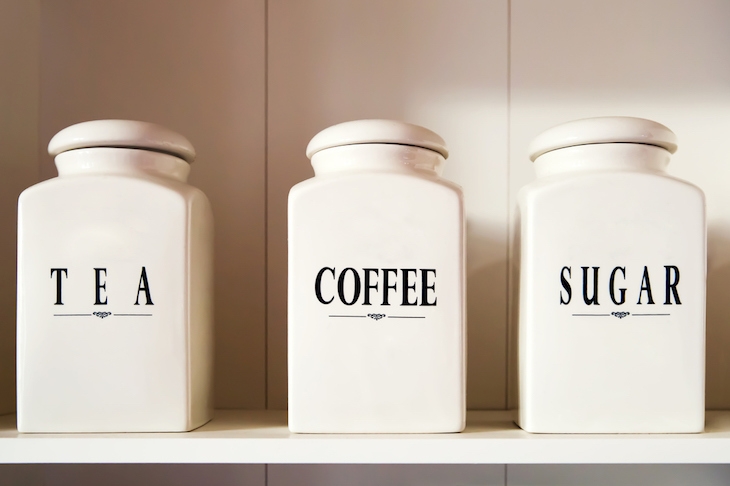Emma Bridgewater has, since 1985, produced pottery acceptable in tasteful middle-class kitchens. Some jars had Coffee on and some Biscuits. Coffee meant ‘coffee’ and Biscuits meant ‘biscuits’.
In a similar attempt to achieve popularity, Theresa May told us that Brexit meant ‘Brexit’. It said so on the jar.
But as the Emma Bridgewater range grew, it included a plate bearing the words ‘Bacon & Egg. Bubble & Squeak’. The ampersands were attractive, but it was unlikely that the plate would really accommodate the items suggested.
Now Brexit, once an admirably plain portmanteau of Britain and exit, became a mug’s game. Its meaning is supposed to vary according to what adjective appears on the pottery mug: vanilla, hard, soft, open, blue or, as the Bank of England imagined last week, disorderly, like a drunk at 1 a.m. on Saturday in some market town.
Ruth Davidson, the Scottish Conservatives’ leader, chirped up during this week’s crisis, saying that, if the Democratic Unionist Party in Belfast had fussily left regulatory alignment on the side of their plate, she wouldn’t mind getting her teeth into it. She called those who rejected this delicious sweetmeat ‘hard Brexiteers’. What could be nastier? They are like hard sums, hard-centred chocolates, sulphurous hard-boiled eggs. Handily, any principled Brexiteer can be called hard. That, though is not the worst language crime associated with negotiating Brexit.
This week’s collapse of talks came after a shuffle of words by the Taoiseach and the Tánaiste — the Irish head of government and his deputy. (Their titles were plucked from the Celtic Twilight, the Taoiseach being literally ‘the chief’ and the Tánaiste ‘the successor apparent to a Celtic chief, usually the most vigorous adult of his kin’, as the Oxford English Dictionary avers.) Anyway, last week the Tánaiste insisted there should be no regulatory divergence between Northern Ireland (‘the North of Ireland’ in his lexicon) and the Republic of Ireland. Yet David Davis, the British Brexit Secretary, had breezily said a few weeks earlier: ‘Of course we will diverge.’ If Britain will, why shouldn’t Northern Ireland, fully part of the UK?
Then this week a text agreed by Ireland and the EU grabbed at a correlative phrase, continued regulatory alignment. Neither phrase pleased Arlene Foster, the leader of the DUP, which happens to lend Mrs May a majority. ‘We will not stand for that,’ she said plainly. She might as well have said, ‘Never, never, never, never,’ as the Revd Ian Paisley said in 1985, and King Lear said in Shakespeare with a rather different intonation.
The whole point of talking of alignment was obfuscation. Mrs Foster knew that, since such wiles are meat and drink to Northern Irish politics. Her anger implied that alignment meant much the same as leaving Northern Ireland as a member of the EU. Perhaps it did. Or perhaps it meant that Northern Ireland would not be plugged into the EU single market circuitry as the Republic is, but would, like an electric toothbrush, gain the same charge by induction. That is a neat analogy, I think, even though it was suggested by my husband in one of his narrow plateau moments between six o’clock drinks and somnolence.
However, he did not, tellingly, know what Ceta was when I asked him. It is an acronym from the initials of the Comprehensive Economic and Trade Agreement between the EU and Canada. Some people said that if Britain could not have a bespoke agreement, it could have one like Ceta. Ceta has been in negotiation since 2009 and just needed ratification by all 28 EU members. Then something shocking happened. During Angela Merkel’s attempts to form a coalition after the German elections in September, she assured the Greens that she would drop ratification of Ceta, if only they’d side with her. As it turned out, the coalition attempt failed for other reasons. But Mrs Merkel’s cynical tactic makes Mrs May’s helicoptering of money on to the DUP look like a Christmas game.
All in all, the three types of ambiguity embodied in the words Brexit, alignment and Ceta explain why most people are baffled by the Brexit talks. Mrs May deliberately made Brexit a platitude, emptied of meaning. The negotiators deliberately spoke with forked tongues by using continued regulatory alignment. And Ceta, most revealingly of all, is one of those everyday acronyms that make Brexit-ry incomprehensible and therefore dull for the millions who voted for it.
Mark Forsyth and Sam Leith discuss Brexit jargon on The Spectator Podcast.






Comments